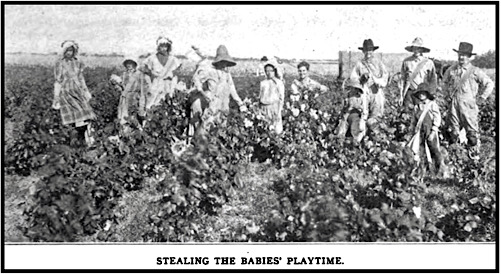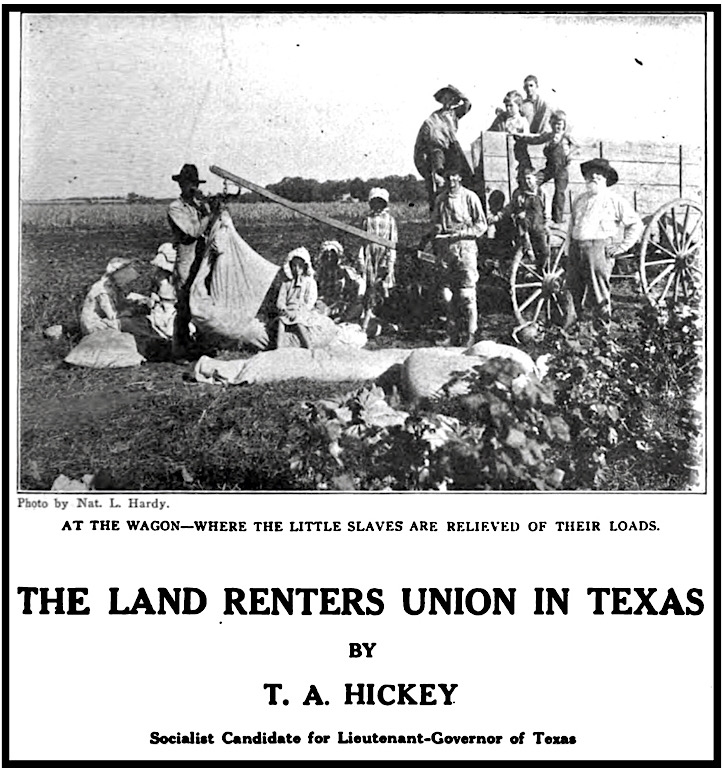 —————
—————
Hellraisers Journal – Saturday September 7, 1912
“The Land Renters Union in Texas” by T. A. Hickey, Part II
From the International Socialist Review of September 1912:
THE LAND RENTERS UNION IN TEXAS
BY T. A. HICKEY
[Part II of II]
Tenantry Inevitable.
In the face of the conditions just sketched it was inevitable that Texas, in spite of her enormous area of free land, should soon find tenantry developing. In 1870 five per cent of the men who tilled the soil in Texas were renters. In 1900 50 per cent were renters, while in 1910 71 per cent is operated by renters, while in the richest black land counties, such as Bell and Falls, 82 per cent of the land is operated by renters. In connection with this I may say that I have had some discussions with some of our socialist statisticians who claimed that the figures were somewhat less than I have given, but they overlooked the important fact, however, that the average renter needs from 80 to 160 acres, according to his family, to make a living, and that there are 29,118 farmers who own less than nineteen acres, a large proportion of whom are compelled to become renters so that they may live, and this is also true of the 98,363 farmers who own from twenty to forty-nine acres, hence my figures are conservative.
Increasing Rentals.
These renters of Texas, for two generations, have been accustomed to pay the landlord the traditional third and fourth, which means that of every three bushels of corn and grain that they produce, the landlord takes one; of every four bales of cotton the tenant produces, the landlord takes one. To the intense disgust of the renter, this third and fourth system is passing away. The landlords have commenced to demand a third all round, which means that the tenant must give up one bale out of every three instead of one out of every four.
Then the landlords commenced to demand of the tenant $1 an acre bonus, and some landlords have demanded as high as $2 and $3 an acre bonus as well as the third and fourth. The putting through of these reductions in the renter’s income produced a storm of discontent and was the main factor that led to the organization of the Renters’ Union, and inasmuch as the economic laws of capitalism will not permit of a reduction in these burdens now being piled upon the renters, it is inevitable that the Renters’ Union shall grow until it it the largest union in the United States.
I will now sketch the reasons why the landlords will not and cannot reduce these burdens.
Within the past fifteen years there has been a steady flow of capital to Texas. It was mostly brought to the state by wealthy farmers of Iowa, Nebraska, Missouri, Ohio and Illinois, who had sold out their lands at an enormous increase over what their fathers had secured them for. They believed they could come to Texas, buy lands at a “reasonable” price and trust to the growth of the state to enable them to secure large piles of unearned increment. They found, however, that the gentleman already on the ground was able to maintain the price of land at a very high figure, largely because of the fact that the public domain had disappeared and all hands were inclined to hold the land which, unlike other things, is a fixed quantity.
Thus it happens that land that in the 70’s sold for $2 per acre jumped to $40, $50, $100 and even higher. I was on one section of black land in Bell county near the town of Rogers last year that had just been sold to a Northern man for $150 an acre. The renters who worked this land when it was selling at $50 an acre paid a third and fourth and the landlord was satisfied with receiving a good return upon his investment, but when this land went to $150 an acre the new purchaser found that after meeting the fixed charges he could not secure 2 per cent on his investment, hence he was compelled, in order to receive what he considered an adequate return, to demand, as well as the third and fourth, $3 an acre bonus.
On the poorer lands, where production is not half what it is in the rich black land, a corresponding condition obtains, but the land being cheaper in price causes the landlord to ask a smaller bonus than in the black land belt. In either case the renter finds himself in the same position as the city wage earner. That is, he just receives enough to keep body and soul together and enable him to prepare for the next day’s toil.
Land Speculators in Clover.
The second reason for the inevitable growth of the Renters’ Union is found in the fact that, owing to the antiquated constitution under which the State of Texas is being ruled and that was drafted originally in the interests of the landlords, it is impossible to place an adequate tax upon idle land that is held out of cultivation for speculative purposes. The constitution provides that land shall not be taxed more than 35 cents on the $100, and the actual tax is considerably less than half of that sum.
Hence the million-acre land owners pay this petty tax on the millions of acres of land that they have fenced in and lie back in silent satisfaction as they watch the population growing by the natural growth within the state and the immense immigration from without. To give my readers an idea of the blighting effect upon the renter that results from this policy I will quote from an article published in the Chicago Tribune some months ago that was written by the present governor of Texas, 0. B. Colquitt. He said:
“There are 146,000,000 acres of land in Texas that has never felt the caressing touch of the plow; 46,000,000 acres of this land is of a mountainous and arid character, but there is 100,000,000 acres of fine arable land that has never been tilled.” The governor goes on to say. “All the public domain has gone. All of this land is now fenced in, in private hands.“


